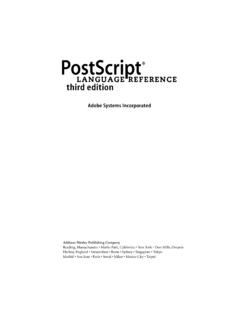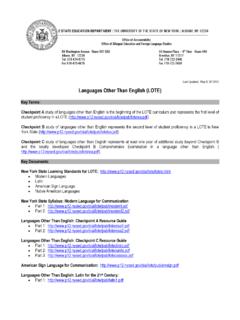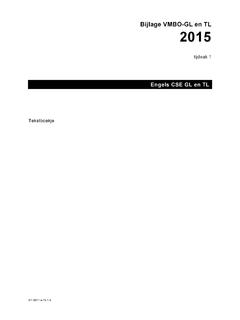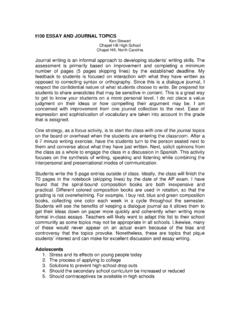Transcription of CHAPTER 1 Fundamental Requirements of a Will
1 2010. CHAPTER 1. Fundamental Requirements of a Will I. What Is a Will? A. Generally roadly stated, a will is the legal declaration of a person's intentions that are to be B performed after his death. A will is generally defined as an instrument by which a person makes a disposition of his property to take effect at his death, and which by its own nature is ambulatory and revocable during his lifetime. In re Estate of Brown, 507 801, 803 (Tex. Civ. App. Dallas 1974, writ ref'd ). While clearly not an advisable practice, a single document may be drafted to serve as both a will and another legal instrument.
2 See Calhoun v. Killian, 888 51 (Tex. App. Tyler 1994, writ denied) (single document qualified as both will and lease); cf. Dickerson v. Brooks, 727 652, 654 (Tex. App. Houston [1st. Dist.] 1987, writ ref'd, ). (single instrument qualified as promissory note and nontestamentary transfer under Tex. Prob. Code 450(a); therefore, transfer at death was effective notwithstanding lack of donor's signature). The Texas Probate Code clarifies the breadth of the term will as follows: Will'. includes codicil; it also includes a testamentary instrument which merely: (1) appoints an executor or guardian; (2) directs how property may not be disposed of; or (3).
3 Revokes another will. Tex. Prob. Code 3(ff). B. Origin of the Phrase Last Will and Testament The origin of the phrase last will and testament is interesting. A common belief is that the term will, being an Old English word, was used by the king's common-law courts, which administered real property, and that the term testament, being of Latin origin, was used by Latin-trained ecclesiastical courts, which administered personal property. However, there is evidence that these assumptions are incorrect and that the words have been used interchangeably as far back as the English records go, even before the development of the Court of Chancery.
4 See David Mellinkoff, The Language of the Law 331 (1963). Professor Mellinkoff's theory is that the phrase last will and testament is traceable to the English law's custom of doubling words of English origin with synonyms of French or Latin origin (free and clear, had and received, etc.). 3. 4 Wills Road Map C. Summary of Basic Requirements The basic Requirements of a will are that . it must identify the testator, it must be written with testamentary intent, . the testator must have testamentary capacity to execute a will ( , over eighteen years of age and of sound mind), and the will must be executed with the requisite testamentary formalities.
5 II. Testamentary Intent A. Generally The testamentary intent requirement is not statutory but is required under a well- developed body of case law. See generally 9 Gerry W. Beyer, Texas Practice Series, Texas Law of Wills .5 (3d ed. 2002). The animus testandi does not depend upon the maker's realization that he is making a will, or upon his designation of the instrument as a will, but upon his intention to create a revocable disposition of his property to take effect after his death. It is essential, however, that the maker shall have intended to express his testamentary wishes in the particular instrument offered for probate.
6 Hinson v. Hinson, 280 731, 733 (Tex. 1955). B. Instrument Clearly Labeled as a Will Typically, there will be no question regarding the testamentary intent of a testator who signs an instrument that is clearly labeled as a will and is in the general form of a will. However, an instrument in the form of a will is not executed with testamentary intent when it is executed under compulsion, merely as part of a ceremony, or for purposes of deception. See Shiels v. Shiels, 109 1112, 1115 (Tex. Civ. App.. Texarkana 1937, no writ) (instrument labeled as will denied probate when instrument was signed solely for purpose of complying with Requirements to enter into lodge, but testator told witnesses that he did not want to make will and signed instrument only after being told he would be able to revoke it after the completion of initiation).
7 C. Models or Instruction Letters Numerous cases have indicated that letters directing the preparation of a will or codicil may not be probated as the person's will. See, , Price v. Huntsman, Fundamental Requirements of a Will 5. 430 831, 833 (Tex. Civ. App. Waco 1968, writ ref'd ) ( [W]ritings were not themselves intended to be her will or codicil, but were instructions or directions to her attorney to prepare a new will or codicil. ). These cases are merely a corollary to the doctrine that the writer must manifest in the writing an intent to make a testamentary disposition of property by that particular instrument.
8 D. Extraneous Evidence of Testamentary Intent Extraneous evidence is admissible to show testamentary intent only if the instrument itself that is offered for probate contains language evidencing testamentary intent but is ambiguous on this point. Straw v. Owens, 746 345, 346 (Tex. App. Fort Worth 1988, no writ) (no amount of extrinsic evidence can supply absent testamentary intent to make instrument a will); Harper v. Meyer, 274. 904, 906 (Tex. Civ. App. Galveston 1955, writ ref'd ) ( But if the instrument does not possess in some degree the essential characteristics of a will.)
9 Sufficient, at least, to give rise to the doubt, extraneous evidence cannot supply that which is otherwise totally lacking. ); Maxey v. Queen, 206 114, 117 (Tex. Civ. App. Fort Worth 1947, writ ref'd ) (extraneous evidence inadmissable because proposed instrument did not contain language of testamentary nature). III. Testamentary Capacity Who Can Make a Will A. Statutory Provision Section 57 of the Texas Probate Code sets forth a two-part test for testamentary capacity. The first component is a status and age requirement.
10 In order to have testamentary capacity, the individual must (1) have attained eighteen years of age, (2). be or have been lawfully married, or (3) be a member of the armed forces of the United States or of the auxiliaries thereof or of the maritime service. Tex. Prob. Code 57. Whether a particular individual satisfies this objective test is rarely an object of much controversy. The second requirement of section 57 is that the testator be of sound mind.. Tex. Prob. Code 57. This subjective component of the testamentary capacity test is a frequent object of controversy.






